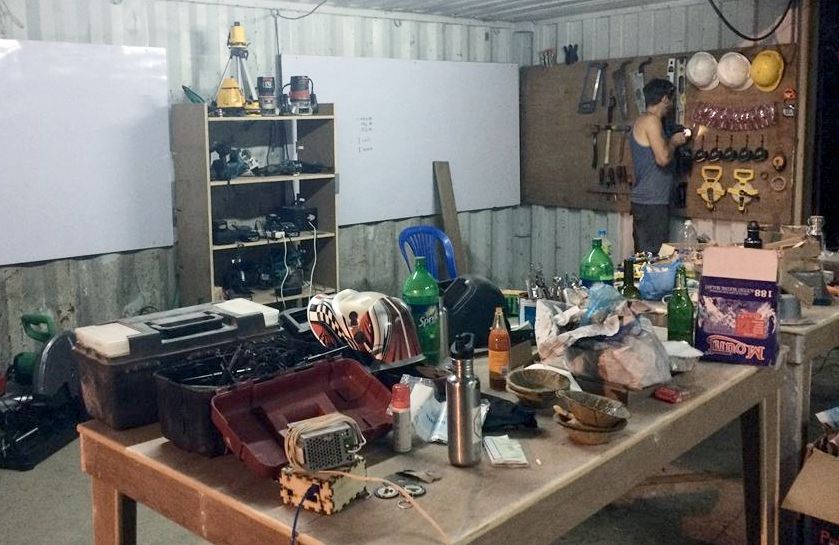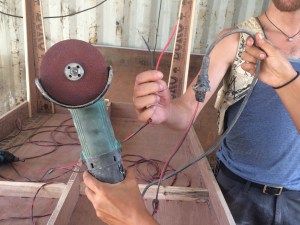MakerNet’s dream: Balance data privacy, monetization

Can we make the world a better place? In September 2016, a year and a half after a 7.8 earthquake and its aftershocks devastated Nepal, I joined “makers” from around the world in Kathmandu. Our goal was to use our problem-solving skills to address the life-threatening challenges still facing the Nepalese people.
The earthquakes had killed nearly 9,000 people, and caused about $10 billion in damages—close to half of the country’s gross domestic product. Basic necessities like electricity, clean water, food, and shelter were decimated and often unsafe to use.
Makers from countries as disparate as Israel, Singapore, and Germany came together. Some were 3D-printing prosthetic limbs for amputees. Others were hacking together off-the-shelf hardware to convert hand-powered wheelchairs into electric ones, or using plastic soda bottles to light houses without electricity.
READ MORE ON DATA PRIVACY
How to strike a balance between security and privacy (Q&A)
So you’re caught in a data breach. Now what?
Europe’s GDPR could change how tech handles privacy
ACLU’s Gillmor on privacy: ‘We pay for what we value’ (Q&A)
Inside school-issued tech: The privacy problem
My experiences there planted a seed: What it would look like if we could bring all these talented makers together to provide aid on a global scale? Of course, “scale” in the Internet Age has often meant sacrificing privacy on the altar of big data. But what if we could do it all: help makers help their communities, at scale, and without compromising the privacy of people who were already suffering?
Makers and hackers value their privacy, and in many ways understand the implications of losing it far better than the rest of us. As the world is increasingly connected on “free” platforms that monetize the personal data of their users, community maker groups known as “makerspaces” around the world have remained stubbornly atomized, like personal computers from the late 1980s. If it were possible to unify the makers of the world on a single platform that put privacy and data autonomy first, what would that look like, and what could be accomplished?
I’m not the only one to pose these questions. Vicky Wenzelmann, an expert in cultural anthropology and co-founder and director of Global Innovation Gathering, a network of social and technological innovators, says makers still lack the connective tissue that binds other tech-based industries.
“Almost every study done on the global maker movement concludes that there needs to be a network platform, and yet none exists,” she says.
So to this end, I have been working to solve this puzzle of creating a maker network that’s also respectful of data privacy.
The Maker Network project began as a way to solve the simple, day-to-day logistical problems of running and using a makerspace. Just about every makerspace needs a way to manage its tools and classes and communicate with members. It’s no fanciful tech pipe dream, either: A major Silicon Valley tech company has invested in our MakerNet.work project, and we’ve formed close alliances with Field Ready, and Nation of Makers. It has evolved into a way to map the skills and capabilities of makers and makerspaces around the world.
Makers and hackers value their privacy, and in many ways understand the implications of losing it far better than the rest of us.
Through MakerNet, for example, disaster relief organizations can search for makers who have logged at least 100 hours on a CNC plasma cutter, or who have worked on projects involving drones and are available to advise on your project. And with further development of the platform, they could tap this network of skilled problem solvers and production capacity to funnel orders for field supplies to makerspaces near disasters, train refugees on how to fix problems in their own encampments when international aid is slow or nonexistent, and empower those hardest hit to solve problems and share those skills with others in similar straits.
The challenge of creating a system to solve these problems leads to three privacy questions: What kind of data is generated by a system like this? What value does that data have? And what needs to be done to protect the data?
So far, the Internet Age has highlighted the ever-expanding importance and influence of surveillance capitalism, through which companies make scads of cash off of consumers’ personal data. Its success as a business model can hardly be questioned.

Look no further than Google, which in many ways began the trend when it used its Adwords algorithm to search emails for keywords, then use them to target ads to Gmail users, or Facebook, whose early employees now plead their mea culpas, with much public hand-wringing. Data cruncher Cambridge Analytica has made a fortune on mining and analyzing personal data, and selling the promise to use this data to sway elections.
In theory, if there were a free, open-source makerspace management platform in widespread use, it could generate a data set that could tell you quite a lot about about who can do which kinds of things with which tools, where they’ve done it, how well they can do it, how long they’ve been doing it, with whom they’ve done it, which classes they’ve taken, whom they’ve taught, and so on.
As a maker, I could see enormous value in this data. It could be reinvested in the community, and leveraged for its benefit. It could also be sold to pay for the substantial cost of developing a project like this.
So is there a viable model for free software that monetizes data and also meets the standards of data autonomy? That’s an open question. There are a couple of early experiments in that field, and we’re taking an approach that I think has promise.
Similar to following HIPAA rules for managing patient data, we’re scrubbing personal information from data created by makers using the MakerNet platform to manage tools, classes, and projects. We’re using pseudonymous identifier account numbers instead of personal data. The information, nevertheless, should be useful to tool manufacturers, for example, about how their tools are used.
So let’s say 5,000 makers use lasers enough to contribute meaningfully to a data set about laser use. If we earn $100,000 in a year from selling data analytics to U.S. laser manufacturers, we could cover our own costs, reinvest in further development of our platform, and distribute the remainder as dividends to the makers who generated the data by using the system.
If every platform that made money on our personal data did this, even with dividends of fractions of a percent, it would amount to significant residual income for billions of people.
Such dividends wouldn’t generate a significant income for most makers, but I think that we could pilot this as a model with societal value. If every platform that made money on our personal data did this, even with dividends of fractions of a percent, it would amount to significant residual income for billions of people. This is similar to the idea of creating an Internet dividend to support a universal basic income.
MakerNet could introduce a new paradigm for software and data privacy in an era when data and identity and privacy are increasingly everybody’s concerns. This could change how the world sees software and privacy, without having to turn to the geopolitical complications borne by regulation.
The financial benefits in the age of software tend to accrue to the investor class and those who can afford to keep their privacy, whereas everyone else is left with a choice to sell their privacy for the services that are increasingly necessary to do business and stay competitive, or protect their privacy at the cost of exclusion from much of the digital world.
Data autonomy, the idea that the data defining our identity belongs as much to us as our own physical body, and with the same rights, has been slow to gain any kind of mainstream acceptance outside of Europe. With laws like the General Data Protection Regulations (GDPR) coming into effect this year, data autonomy will not only be critical for software used and sold in the European Union, but also for companies outside Europe who want to do business across its borders.
Turning MakerNet from a dream borne of the earthquake-riven streets of Kathmandu into a reality has not been easy. I’ve spent the last couple years working production gigs and doing odd jobs, couch-surfing in Southeast Asia and Spain, and trying to walk that fine line where I have enough free time to keep this project alive, and enough money to eat. I lived out of a carry-on bag for two years, never anywhere longer than a few months, often unsure where I’d be next or how I’d keep going.
I have often turned to the works of science fiction author and playwright Monica Byrne for solace. In a speech she gave at Texas A&M University on February 2, she said, “Nowhere is it written that capitalism is natural, that poverty is natural, that war is natural, that patriarchy is natural, that monogamy is natural, that individualism is natural, or that the two-parent, two-child family is natural. We made all that up. Hedge funds, corporations, institutions, oligarchies, profit, brands, nation-states, borders—we made all that up too. At the most fundamental level, they are fictions. We can make new fictions in their place. And we must be very, very careful which fictions to choose.”
It’s worth remembering that as inevitable as some things may seem, they are not written on any stone tablets and not encoded in the laws of physics. There are other ways for the world to be.
